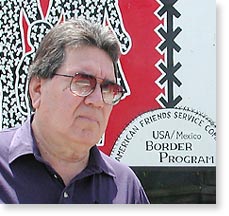|
A Call for a Humane U.S. Immigration Policy A critique of President G. W. Bush’s immigrant identification plan Roberto L. Martinez
Globalization, the North American Free Trade Agreement (NAFTA), the Free Trade Area of the Americas (FTAA), national security, the Patriot Act, and a new immigration proposal by President Bush in January 2004, continues to shape global, economic, immigration, and border enforcement policies in the U.S. and Latin America. January 1st, 2004 marks the tenth anniversary of the launching of NAFTA, which after ten years has failed to produce jobs in Mexico and has, in fact, displaced tens of thousands of workers who in turn have joined the migrant exodus to the U.S. October 1st of 2004 will also mark the tenth anniversary of Operation Gatekeeper, the Border Patrol strategy that has cut off traditional migrant crossing areas along the San Diego/Tijuana border and is forcing migrants to cross into the California and Arizona deserts where hundreds of migrants continue to die. The death toll for the last ten years has now reached 2,600 deaths. The death toll could pass the 3,000 mark by October 1st. The U.S. Border Patrol maintains that the operation is a success because apprehensions are down in the San Diego area. Human rights abuses continue throughout the U.S./Mexico border region. As the U.S.-Mexico Border Program (USMBP) begins its 21st year monitoring and documenting national immigration and border enforcement policies, as well as human rights issues, it will be fulfilling a long and rich tradition of AFSC: that of “welcoming the stranger” and its historic witness for human dignity and human rights. The AFSC has recognized from the beginning that migration is a central component of the human experience. Today, as in centuries past, millions of people continue to move across continents, oceans, and international borders in response to economic changes, war, and environmental destruction. The American Friends Service Committee continues to express its continued support and affirmation of the basic principle that people who have established new lives in the United States and who work, pay taxes, and contribute to the economic, social and cultural development of communities, should have access to a legalization process that leads to permanent residency and citizenship. The AFSC calls on the government to implement a humane immigration policy that:
Both the Clinton and Bush administrations are responsible for passing some of the most restrictive and repressive immigration and border enforcement policies in recent history. The 1996 Immigration Reform and Immigrant Responsibility Act (IRAIRA), a retroactive law, continues to devastate families by arresting spouses who committed crimes decades earlier, but are arrested and deported because of the retroactive provision in the law. IRAIRA was passed as part of the Anti-terrorist Act following the first bombing of the World Trade Center in 1993 and the bombing of the federal court building in Oklahoma in 1994.
Immigrants continue to be blamed for taking jobs away from American citizens. Yet, jobs are being sent overseas by the thousands every year. It is estimated that in the last three years over 400,000 jobs have been sent overseas to places like China, India, and Taiwan. In fact, China has replaced Mexico as the U.S.’s largest export partner after Canada. Maquiladoras, or “twin plants” in Mexico, are closing at an alarming rate and sending their business to China because there they can pay wages as low as $.59 cents an hour compared to $1.47 an hour in Mexico. The decision to take away jobs from U.S. workers to pay immigrants low wages is a result of corporate greed, not the fault of immigrants. From 1979 to 1996, U.S. corporations eliminated more than 43 million U.S. jobs. Since President Bush took office, 2.7 million jobs in the private sector have been lost. Immigrants are essential to the U.S. economy:
In the final analysis, the immigration issue will not be solved by free trade agreements, guest worker programs, or legalization programs that create a whole new generation of second-class citizens, such as President Bush is proposing. The Bush plan is nothing more than a thinly-veiled attempt to identify immigrants already in this country. As I told the Mexican media, Mexican immigrants should see this plan as nothing more than a trap. We in the immigrant rights business are not fooled one iota. We see it as nothing more than an election year plan to attract the Latino vote, which he needs to win. Ultimately, the solution to the immigration issue will be economic development in third world countries, as well as economic policies that encourage and fund sustainable development that permits working people to earn a living wage in their home countries. Ten years of NAFTA and ten years of Operation Gatekeeper have combined to create one of the worst economic, environmental, and human rights disasters in the history of the U.S./Mexico border. The American Friends Service Committee is strongly committed to the struggle for change in immigration and border enforcement policies, justice, and equality. We are also committed to working with other organizations who share these concerns. We applaud the steps immigrant communities have taken to project their own voices into the policy arena and commit ourselves to work alongside them to assure that their voices are strongly heard in the movement for a just immigration policy. In these uncertain times, when civil liberties are under constant attack by right-wing politicians and hate groups, we are reminded that not much has changed in 40 years. Race, culture. and citizenship status continue to be obstacles to equal rights and equal justice. Published in In Motion Magazine - January 26, 2004 Also read:
|
||||||||||||||||||||||||||||||
Copyright © 1995-2013 NPC Productions as a compilation. All Rights Reserved. |
||||||||||||||||||||||||||||||



